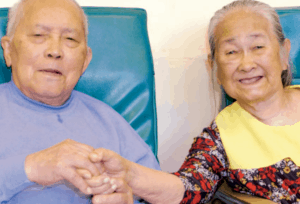Understanding How Alzheimer’s Disease Changes People— Challenges and Coping Strategies (Part 3 of 3)
Alzheimer’s disease is an illness of the brain. It causes large numbers of nerve cells in the brain to die. This affects a person’s ability to remember things and think clearly. People with Alzheimer’s disease become forgetful and easily confused. They may have a hard time concentrating and behave in odd ways. These problems get worse as the illness gets worse, making your job as caregiver harder.
It’s important to remember that the disease, not the person with Alzheimer’s disease, causes these changes. Also, each person with Alzheimer’s disease may not have all the problems we talk about in this book.
The following sections describe the three main challenges that you may face as you care for someone with Alzheimer’s disease:
- Changes in communication skills
- Changes in personality and behavior
- Changes in intimacy and sexuality
Each section includes information on how to cope with these challenges.
3. Challenge: changes in intimacy and sexuality
Intimacy is the special bond we share with a person we love and respect. It includes the way we talk and act toward one another. This bond can exist between spouses or partners, family members, and friends. Alzheimer’s disease often changes the intimacy between people.
Sexuality is one type of intimacy. It is an important way that spouses or partners express their feelings physically for one another.
Alzheimer’s disease can cause changes in intimacy and sexuality in both the person with Alzheimer’s disease and the caregiver. The person with Alzheimer’s disease may be stressed by the changes in his or her memory and behaviors. Fear, worry, depression, anger, and low self-esteem (how much the person likes himself or herself) are common. The person may become dependent and cling to you. He or she may not remember your life together and feelings toward one another. Sometimes the person may even fall in love with someone else.
As the caregiver you may pull away from the person in both an emotional and physical sense. Some may be upset by the demands of caregiving. Others may also feel frustrated by the person’s constant forgetfulness, repeated questions, and other bothersome behaviors.
Most caregivers learn how to cope with these challenges, but it takes time. Some learn to live with the illness and find new meaning in their relationships with people who have Alzheimer’s disease.
How to cope with changes in intimacy
Remember that most people with Alzheimer’s disease need to feel that someone loves and cares about them. They also need to spend time with other people as well as you. Your efforts to take care of these needs can help the person with Alzheimer’s disease to feel happy and safe.
It’s important to reassure the person that:
- You love him or her
- You will keep him or her safe
- Others also care about him or her
When intimacy changes, the following tips may help you cope with your own needs:
- Talk with a doctor, social worker, or clergy member about these changes. It may feel awkward to talk about such personal issues, but it can help.
- Talk about your concerns in a support group.
- Think more about the positive parts of the relationship.
- Get more information. Some books, articles, and DVDs/videos can help you understand how Alzheimer’s disease affects intimacy.
How to cope with changes in sexuality
The well spouse/partner or the person with AD may lose interest in having sex. This change can make you feel lonely or frustrated. Here are some possible reasons for changes in sexual interest.
The well spouse/partner may feel that:
- It’s not okay to have sex with someone who has Alzheimer’s disease
- The person with Alzheimer’s disease seems like a stranger
- The person with Alzheimer’s disease seems to forget that the spouse/partner is there or how to make love
A person with Alzheimer’s disease may have:
- Side effects from medications that affect his or her sexual interest
- Memory loss, changes in the brain, or depression that affects his or her interest in sex
Here are some suggestions for coping with changes in sexuality:
- Explore new ways of spending time together.
- Focus on other ways to show affection. Some caregivers find that snuggling or holding hands reduces their need for a sexual relationship.
- Some may try other nonsexual forms of touching, such as giving a massage, hugging, and dancing.
Publish by National Institute on Aging.

